
Contracts are the backbone of the music industry, governing collaborations and partnerships, safeguarding rights, and ensuring fair and timely compensation. A well-negotiated music industry contract can address key terms such as royalties, advances, ownership, and promotion, significantly impacting various aspects of an artist's career, including contracts, financial transactions, and additional income streams.
Contracts are vital for various professionals within the industry, highlighting the importance of understanding and negotiating these agreements to avoid potential pitfalls. Contracts are used in almost every aspect of the music business.
Understanding the structure and significance of various music-related agreements, from music producer contracts to co-publishing and management agreements, is crucial for everyone in the music industry – from artists to label execs to entertainment attorneys to everyone in between. Understanding what constitutes a contract, and how they’re structured and formed, will help give you a leg up in the music industry.
Understanding Music Industry Contracts
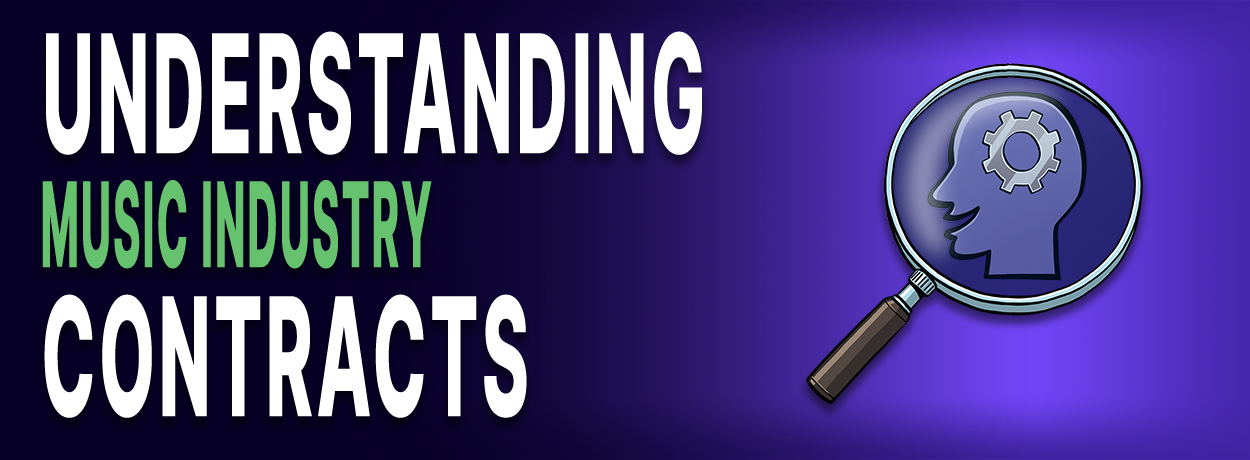
A contract, also known as an “agreement” or “legal agreement,” is a legally binding document between two or more people or entities (known as parties to the contract) that contains promises made between the parties.
Legal agreements, especially in the context of music licensing, detail the terms under which music will be used, including the length of the segment, the prominence of the cue, and the monetary compensation for the artists.
The terms of a contract are spelled out in clauses, which are subsections of the agreement that generally speak to particular promises and rights under the agreement. For example, a “compensation” clause that specifies the money one party is paying to the other.
What Constitutes a Record Label Contract?
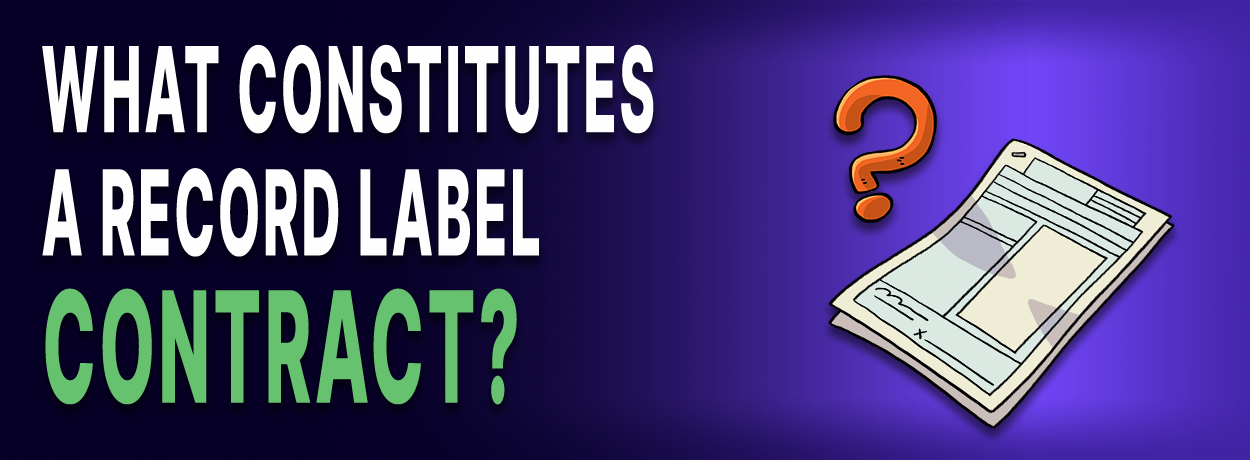
In order for a contract to be legally binding, three elements are required:
1. An offer
2. Acceptance
3. Consideration
An offer is a proposal for entering into an agreement. For example, if I tell you that I’ll sell you my 1961 Fender Stratocaster for $5,000, I’ve made you an offer to buy the guitar for $5,000. An offer can be conveyed verbally or in writing—though it’s always better to have it in writing.
Acceptance is agreeing to the proposed offer. This could be verbally accepting the offer, giving written acceptance, or by implication. Implied acceptance is when a party doesn’t explicitly agree to the offer, but still perform the terms of the agreement. For example, if you don’t respond to my offer to sell you the Strat but show up at my office, give me $5,000, and take the guitar, then you’ve accepted the offer.
The final element of a valid contract, consideration, is something of value that is exchanged in an agreement. It is the bargain. This could be money—like the $5,000 for the Strat—or it could also be something else of value, like performing a service. For example, imagine if I agreed to give you the Strat if you powerwashed my house. The service being performed is still something of value.
You can rest assured that any recording agreement, like every other music business contract, will contain those three elements: an offer, acceptance, and consideration.
Given the complexity of some contracts, it's generally wise to seek legal advice to ensure that all elements of a legally binding agreement are properly addressed, safeguarding your rights and interests.
How Music Contracts are Formed?
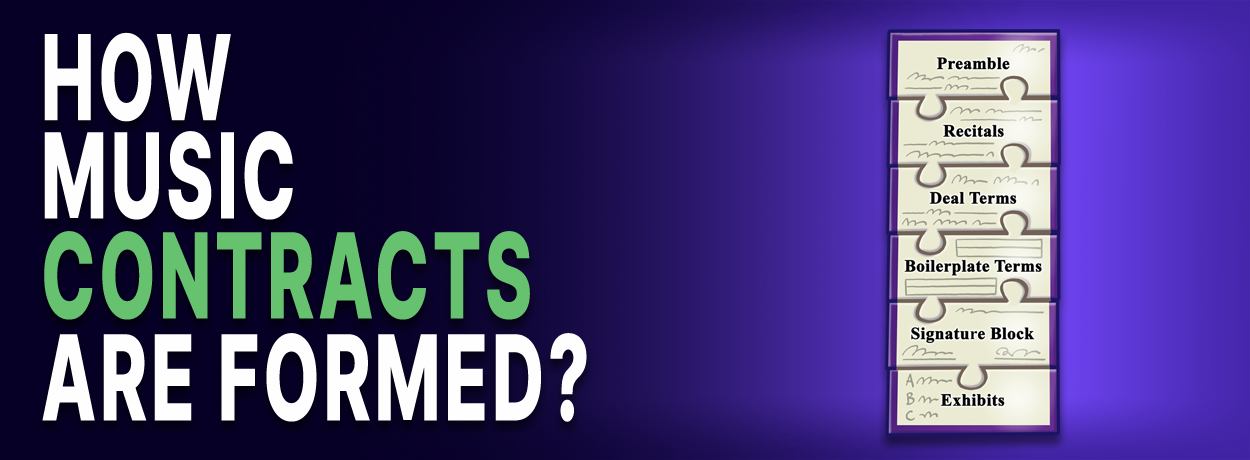
Contracts typically include, most if not all of the following general sections:
-
Title of agreement
-
Preamble and date(s)
-
Recitals (or “whereas” clauses)
-
Defined Terms. For instance, in a music contract, 'master recordings' might be a term that is specifically defined to clarify ownership and rights.
-
Terms and conditions: Business terms. Examples of contracts with specific business terms include a 'record label contract' and a 'distribution contract', which detail the rights,
responsibilities, and financial aspects involved in the music industry.
-
Terms and conditions: Boilerplate provisions
-
Signatures
Title of Agreement

At the very top of every agreement, there is a title. This could be “recording agreement” or “producer agreement.” The title is simply there to enable someone who picks up the agreement to know what it is. Contrary to popular belief, in most instances, the title of the contract has no bearing on its validity or enforcement.
Preamble

Contracts tell stories between the parties. The preamble, the very first paragraph of a contract, explains who the parties are, provides their addresses and other contact information, and generally establishes the date that the contract is effective.
Recitals
Sometimes, the backstory between the parties and why they're entering into a deal is important for understanding the agreement being made. These are typically the paragraphs that start with the phrase “whereas.”
Defined Terms

In contracts, you may notice words that are capitalized within the middle of a sentence. These are what is known as “defined terms.” It is standard for certain words or terms to be defined in an agreement, and then that capitalized term will be used throughout the remainder of the contract.
For example, if someone will be providing services under the deal, instead of describing those services over and over every time they're mentioned in the document, they might describe the services just one time in the agreement and define them by one word: “Services” with a capital “S”. Then, any time the full description of the party's services needs to be referenced, the contract will simply use the defined term “Services” with a capital “S” as opposed to lowercase “s” services.
Terms and Conditions—Business Terms

Contracts contain “material terms” which are the most important promises made between the parties, such as the amount of money one party is paying the other, what services or rights one party is providing or granting to the other, how long the contract will last, etc. These terms are sometimes referred to as the “business terms” of the deal.
An example of a contract with specific business terms is a classic record deal, which regulates aspects such as manufacturing, distribution, marketing, advance, percentage allocation, social media management, production volume, format, exclusivity, duration, sub-license rights, sync, and merchandising rights. It's crucial for musicians to understand these complex terms before signing. Additionally, a music publisher plays a vital role in negotiating business terms related to copyrights and royalties, ensuring that songwriters and artists are fairly compensated for their work.
Terms and Conditions—Boilerplate Provisions

Contracts also contain “non-material terms” which deal with how the overall agreement is administered and enforced, such as how the parties formally communicate with one another,
what laws govern it, how parties enforce it, etc. Non-material terms are typically contained in what are known as “boilerplate clauses.” They're called “boilerplate” because they appear in
almost every agreement. This is not to say they're unimportant, but rather, that they're not the heart of the deal being struck between the parties.
Signatures

The signing of an agreement is sometimes referred to as the “execution” of the deal. If one party signs, the agreement would be “partially-executed.” If both parties have signed, the agreement would be “fully-executed.” In most cases, a contract is not binding until both parties have signed it.
Examples of Music Industry Contracts
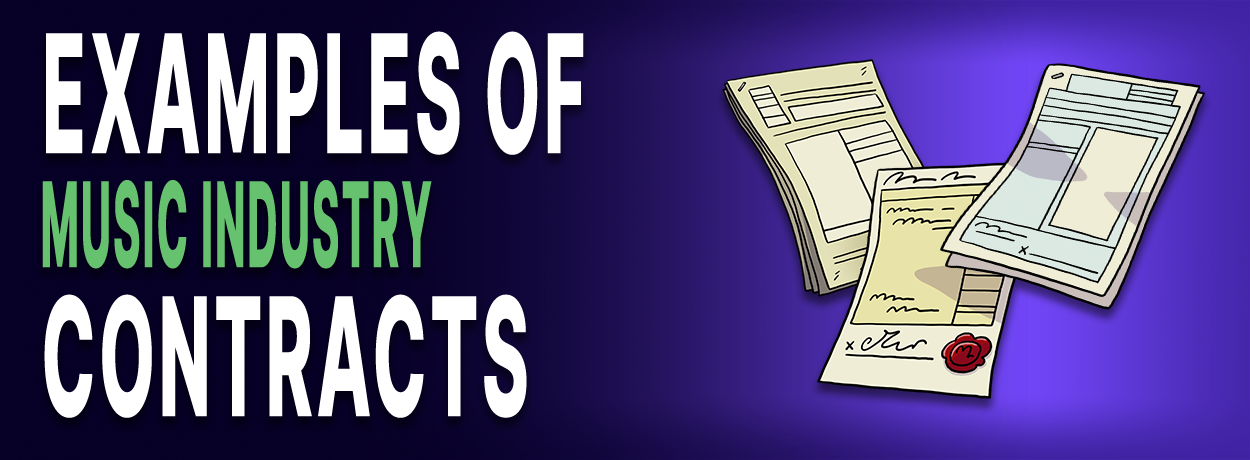
Now that we have a general background on how contracts are formed and generally structured, let’s look at an overview of some of the most common contracts that are encountered in the music business.
Recording
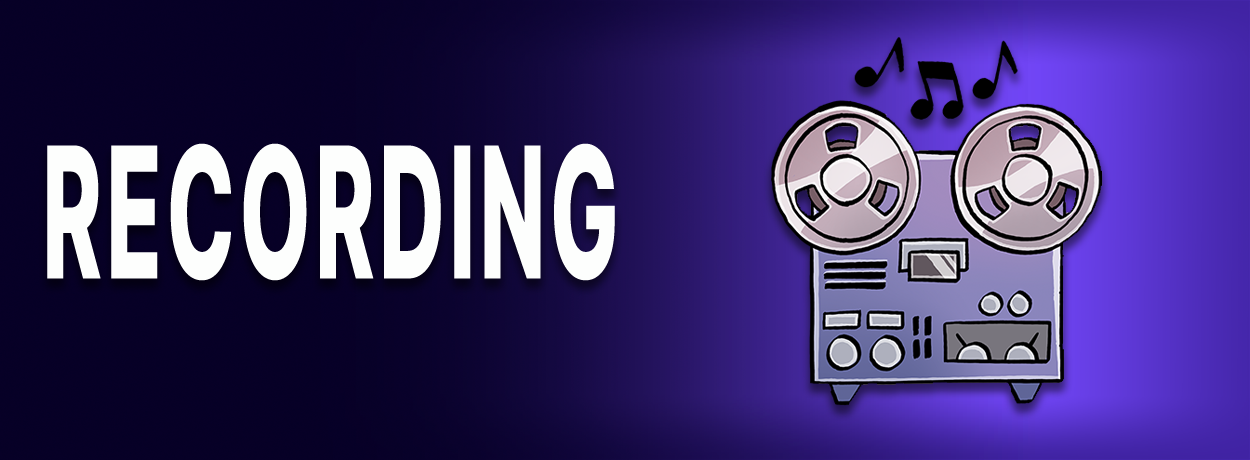
Producer Agreement
Producer agreements outline the relationship between music producers and the artists they are producing, encompassing their roles, responsibilities, royalties, and rights concerning the
produced music and its commercial release.
Work-for-Hire Agreement
In the music industry, most work-for-hire agreements function to establish ownership rights, stating that the commissioned work belongs to the hiring party. These agreements are common — and important —when hiring session musicians and/or others to contribute to a recording.
Not only will the work-for-hire agreement dictate the hired musician’s fee, but it also confirms that the hiring party will own all rights to the musician’s performance. Without a work-for-hire agreement in place between artists (and/or producers) and the session musician they’ve hired, copyright ownership of the recording in question can get messy — especially if the recording starts generating a lot of money.
Mixer Agreement
Mixer agreements outline the relationship between artists (and sometimes record labels) and mixing engineers who mix produced recordings. These agreements specify the roles of the parties, the fee paid to the mixer (and royalties, if any), and the rights of the parties in the mixed music and its commercial release.
Featured Artist Agreement (a/k/a Side Artist Agreement)
Featured artist agreement specify how side artists are engaged and compensated when they are featured on another artist’s record. These agreements typically cover what services the featured artist will be performing, how the featured artist will be compensated and receive royalties, how they are credited, and how their name and likeness can be used in connection with marketing and promoting the recording.
Beat License Agreement
As it is now more common than ever for existing beats to be used in recordings, a beat license agreement specifies the terms and conditions of how a beat owned by one party (the licensor) is licensed to an artist or producer (the licensee) for use in connection with a new recording.
The material terms of beat licenses are typically whether or not the license is exclusive (e.g., can other artists use the beat), how long the license lasts for (the term), how much the beatmaker is being paid (compensation), and how the beatmaker is credited in connection with the new recording.
As most beats that are licensed contain original compositions written by the beat maker, the beat license agreement will also address the beatmaker’s ownership interest in the new composition that is being created and how the publishing of the new composition will be administered and controlled.
Beat Purchase Agreement
Unlike a beat license agreement where the beatmaker continues to own the beat, and the copyright(s) in the beat, a beat purchase agreement is where the beatmaker sells the beat to an artist or producer for use in one or more new songs.
The material terms of beat purchase agreements are what fee is being paid to the beatmaker for the beat, whether or not they will continue to receive royalties from the exploitation of the new song, whether or not they retain any ownership in the underlying composition embodied in the beat (if so, what ownership percentage will the beatmaker retain and whether they can administer their share of the publishing, and how the beatmaker will be credited in connection with new songs using the beat.
Writing and Music Publishing
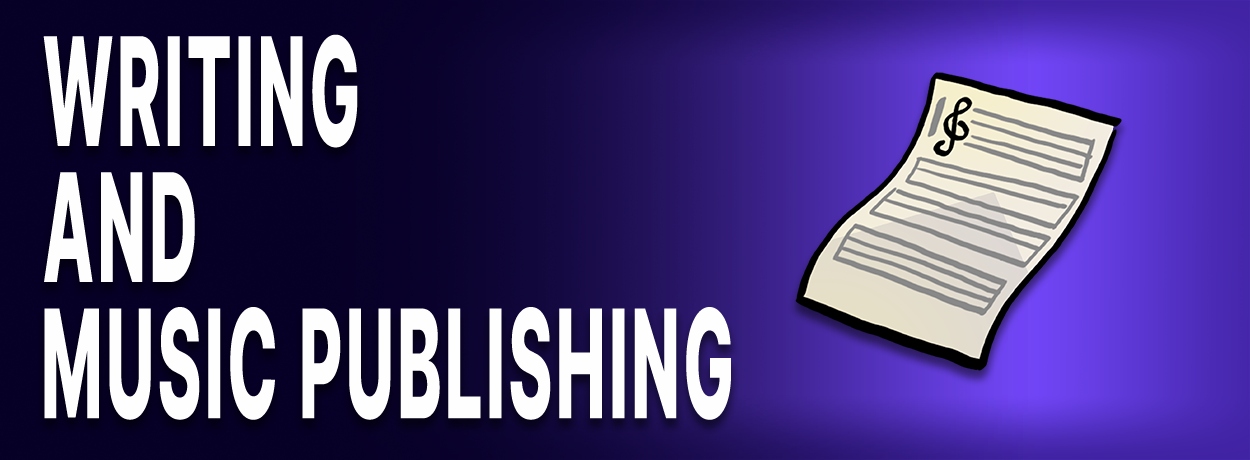
Song Split Agreement
Whenever two or more co-writers write a song together, they should sign a song split agreement. A song split agreement specifies the copyright ownership of the co-writers in the newly created musical composition, whether or not they can each administer their publishing shares of the new composition.
Publishing Agreement
This is what is sometimes referred to as a “full publishing” agreement. A songwriter assigns ownership of their musical composition copyrights to a publisher in exchange for an advance and typically a share of the publishing revenue moving forward. The publisher exclusive administers the compositions.
Co-Publishing Agreement
These are publishing agreements where songwriters and publishers jointly manage and exploit co-own the songwriter’s musical compositions, delineating revenue splits, rights, responsibilities, and the administration of the songwriter’s musical composition copyrights. Under co-publishing agreements, the publisher almost always exclusively administers the compositions.
Publishing Administration Agreement
Under this type of agreement, the songwriter retains ownership of their musical compositions and the publisher exclusively administers the songwriter’s rights in the compositions in exchange for an administration fee.
Record Labels and Music Distribution
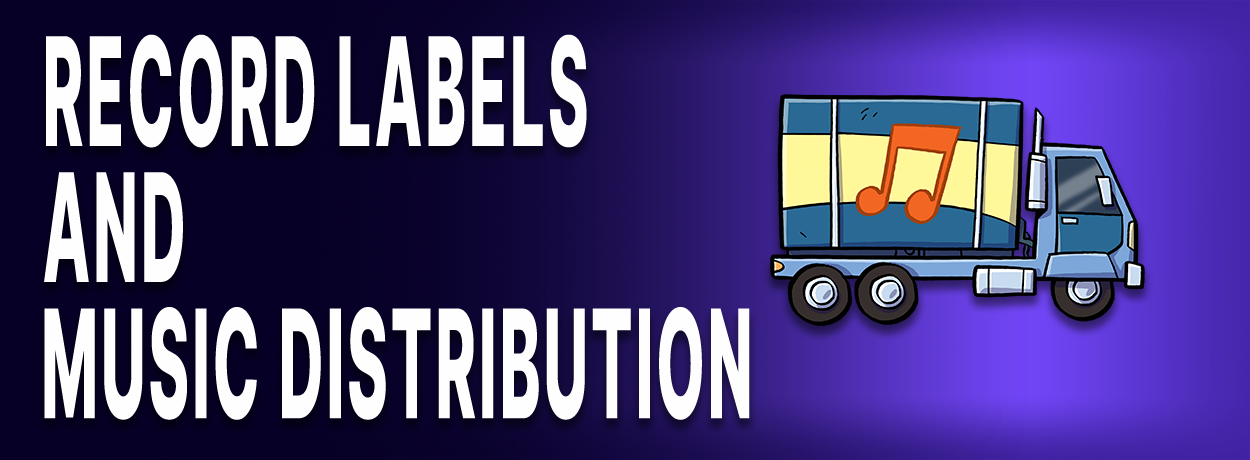
Recording Agreement
An agreement between a recording artist and a record label for the recording and release of the artist’s recordings. The material terms are whether or not the label owns the recordings (or if the
artist is licensing them to the label), what advances and royalties are paid to the artist, how long the artist is exclusive to the label, what marketing and promotional obligations the label has, and
what type of creative control the artist retains over the release of their recordings.
There are many different types of recording agreement, from major label deals to independent label agreements.
Distribution Agreements
Once sound recordings have been created, they needs to be delivered or distributed to the public so it can be purchased, streamed, or otherwise consumed. Music distributors are the companies that make this happen.
Music distribution comes in two forms:
1) physical distribution—the distribution of physical copies of recorded music, such as vinyl records, CDs, and cassette tapes; and
2) digital distribution—the distribution of digital copies of recorded music through digital streams and digital downloads. Distribution agreement are typically between a copyright owner and a music distributor.
The distributor sells or otherwise makes available the copyright owners music in various media (physical or digital), and in return takes a distribution fee for their services. Some distribution companies also provide marketing and promotional services in exchange for a higher distribution fee.
Master Use License Agreement
Master license agreements grant permission to use previously recorded music, defining terms such as royalties, territories, and exclusivity, especially for purposes like synchronization in films or commercials. Any and all commercial exploitations of a musical composition or sound recording will be governed by a Music License Agreement – the precise agreement determined by the nature of the song or recording’s use.
Artist Management

Artist Management Agreement
An agreement between an artist and a manager in which the manager counsels and advises the artist with respect to their career in the entertainment business. In exchange for representing the artist’s interest, the manager is paid a commission, which is typically based on the income that the artist receives during the term of the manager’s representation.
Booking Agent Agreement (a/k/a Music Agent Agreement)
These agreements outline the relationship between an artist and their booking agent, defining terms of representation, commissions, and duties related to securing live performance and promotional appearances for the artist.
Live Performance Agreement
Agreements between an artist and a venue or a promoter for an artist’s live performance. They set forth the fee that the artist is paid for their performance—either a flat fee, a percentage of ticket sales, or some combination, can cover the production specifications for the artist’s performance, how the artist’s merchandise can be sold at the performance, etc.
Music License Agreement
A music license agreement governs the use of music, specifying terms, duration, and the permitted scope of usage. It defines where and how music can be utilized, such as in films, commercials, or public performances, along with the payment structure from those uses.
For example, if you want to include a sample in one of your recordings, you’ll first need to secure a license for it from the sample owner – ie: the individual(s) or entities that own the sound recording and/or musical composition copyrights in the desired sample.
Similarly, anytime a film or TV show wants to use a musical composition or recording in their production, they will need to negotiate a license agreement with that song/recording’s copyright owner(s). This can be a significant source of revenue for songwriters (or the musical composition copyright owner) and the owners of sound recording copyrights.
Synchronization License Agreement (a/k/a Synch License)
A license to reproduce and synchronize a musical composition with a video (i.e., match the music to a moving image.) This is license is typically granted by the publisher(s) of the composition. The principle terms are the license fee, territory, timing, media, and exclusivity of the use.
Master Use License Agreement
Master use license agreements cover the use of sound recordings with audiovisual content. They are counterparts to synchronization licenses for musical compositions. These licenses are typically granted by the record label or sound recording owner, and like composition synchronization licenses, the principle terms are the license fee, territory, timing, media, and exclusivity of the use.
Music Agreement Template
Templates provide a standardized framework for creating various music-related contracts, ensuring clarity and consistency in agreements, including artist contracts, licensing deals, or producer agreements. Most music business agreements are comprised of six principal sections, the preamble, recitals, deal terms, boilerplate terms, signature blocks, and exhibits.
Music Rights Agreement
This agreement specifies ownership and usage rights for musical compositions or recordings, detailing who retains control and receives royalties for the copyrights in question.
Standard Music License Agreement
Standardized contracts explicitly outline terms and conditions for licensing music, providing clarity and uniformity across different projects. While the terms in any music license agreement can and will vary, the basic structure of the license agreement typically remains consistent.
There are, of course, several different types of Music License Agreements, ranging from synch deals with TV shows, films, and ad campaigns, to license agreements for the use of samples in recordings, and more. Every commercial use of recorded music will be governed by a Music License Agreement of one sort or another – depending upon the stated use of the recording and/or composition being licensed.
Music Artist Agreement Contract
There are, of course, many different agreements a professional recording artist will enter into, from management contracts to their publishing and recording deals. These contracts define the rights, responsibilities, and relationships between artists and the entities they are engaging with, covering everything from record releases, royalties, tour commitments, payment dates, promotional activities, and more.
Musical Instrument or Equipment Rental Agreement
These agreements detail terms for renting musical instruments, specifying responsibilities for maintenance, insurance, and rental duration. These rentals can also extend to the PA and lighting systems artists bring on tour with them.
Apple Music License Agreement
Specifically, an agreement with Apple Music regarding the licensing and distribution of music on their platform, specifying terms and conditions unique to this platform.
Emphasizing Clarity and Legal Expertise

Clarity in Contract Language
While many music industry agreements might appear to be just a lot of confusing mumbo jumbo to the untrained eye, they are anything but. Clear and understandable language in music contracts is paramount to avoid misinterpretations that may lead to disputes or legal challenges. Every word found in an agreement has a purpose, and these purposes must be clearly defined.
Legal Counsel for Music Business Agreements
Given the complexities involved, seeking legal advice ensures compliance with industry standards, safeguarding the interests of all parties involved. In most if not all music industry agreements, there will be an Advice of Counsel clause, stating, essentially, that all parties to the deal have consulted with an attorney and understand what they are signing.
There is never an obligation to hire an attorney to review your music industry contracts, but by agreeing to this
clause you are either acknowledging that you are signing the deal based on your lawyer’s advice or have willingly chosen not to. With an Advice of Counsel clause in the deal, no party can later go to a court claiming that the agreement was so one-sided that they never would have signed it had they understood it better.
Contracts in the music industry, whether involving music licenses, artist management agreements, or publishing contracts, are indispensable tools for facilitating collaborations and protecting stakeholders' rights. Understanding the nuances of each agreement, utilizing templates where necessary, and ensuring clear communication are vital for successful partnerships and navigating the intricacies of the music business.
Mastering these intricacies empowers stakeholders to create equitable arrangements, safeguard intellectual property, and navigate the ever-evolving landscape of the music industry with confidence.
Seek Legal Advice

Of course, there’s more to understanding music industry agreements than knowing what they are and how they’re typically structured. While learning these music business contracts should essentially be obligatory for pretty well every music industry professional (artist managers, A&R personnel, talent agents, etc.), being able to read and understand them is paramount for artists and producers as well. After all, they outline the responsibilities and business relationships they
have between their managers, publishers, record labels and most other industry professionals they work with.
These agreements are obviously pivotal in protecting the artist's rights and interests, especially in an era where recorded music and streaming services like Spotify, Apple Music, and Amazon Music significantly impact the industry's revenue and distribution of music.
Artists often deal with these business entities themselves, certainly if they're self-managed, so being able to fully understand the agreements they enter into is obviously critical to ensuring they're not vulnerable to exploitation.
The evolving nature of the music industry, with the rise of digital distribution and the importance of fair compensation from streaming services, underscores the need for well-drafted contracts to safeguard the interests of recording artists and ensure their careers flourish under fair terms.
This blog is an excellent place to start attaining this knowledge. But for a more comprehensive look at contracts in general and how music industry agreements are put together, check out the Basics of Agreements course at Creative Intell. In addition to much more detailed text instruction, the course is chock full of charts, clever animated videos, and interactive learning checks that make contracts and contract formation easy for non-lawyers to understand.
But if you don't have the time or desire to learn any of the aforementioned contracts in detail, you can always skip the education and know that any music contract template you download from Creative Intell will be of the highest quality - drafted by top entertainment lawyers. A legal team who know these contracts inside-out, and then some!
But if i may offer a word of advice here; given you'll be using these contracts a lot in your music career, understanding how they work will save you a lot of money - in legal fees for starters, let alone should you mistakenly sign an unfair, rip-off deal.
While procuring superior music contract templates from genuine music lawyers is already super important, (most music contract templates you find online are terrible, full of legal holes that could cost you big time!), being able to understanding them yourself is invaluable - especially when all that education already comes free with the templates you download from Creative Intell.
(Author's Disclaimer: I’m one of the music lawyers at Creative Intell who built these courses - alongside the contracts that come with them).
Disclaimer language:
Creative Intell is not affiliated, nor associated in any way, with any third parties referenced herein, nor their respective goods or services. Any and all third-party tradenames, trademarks, and/or service marks referenced are used for informational purposes only, and are the exclusive property of their respective trademark owners.







